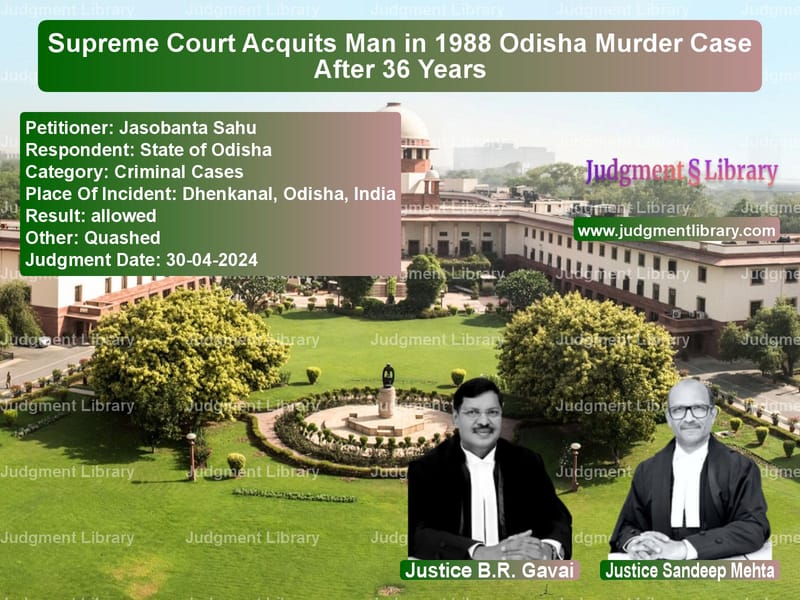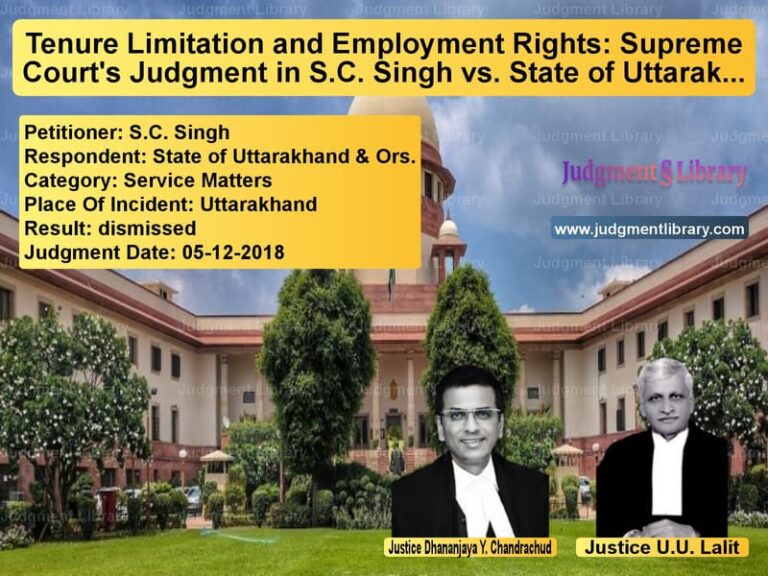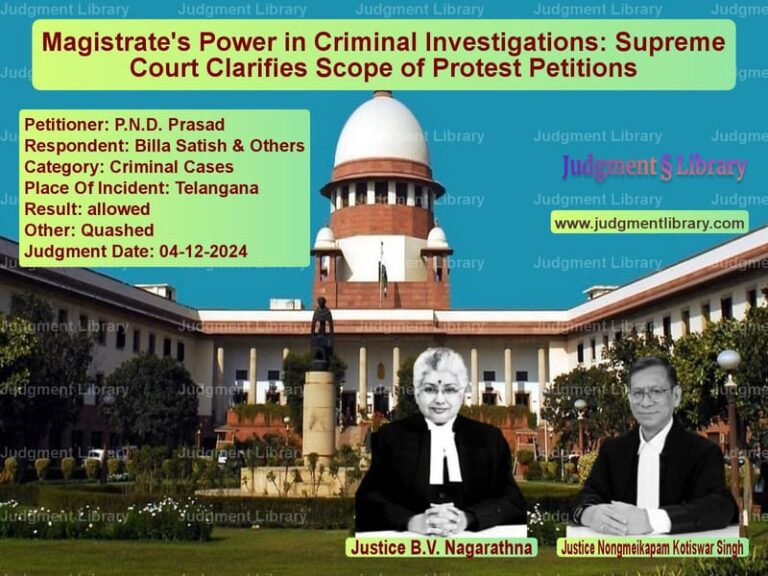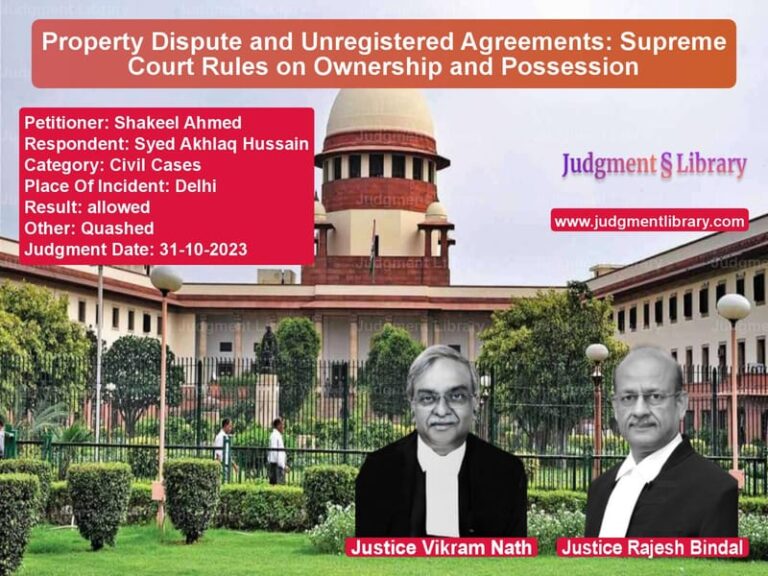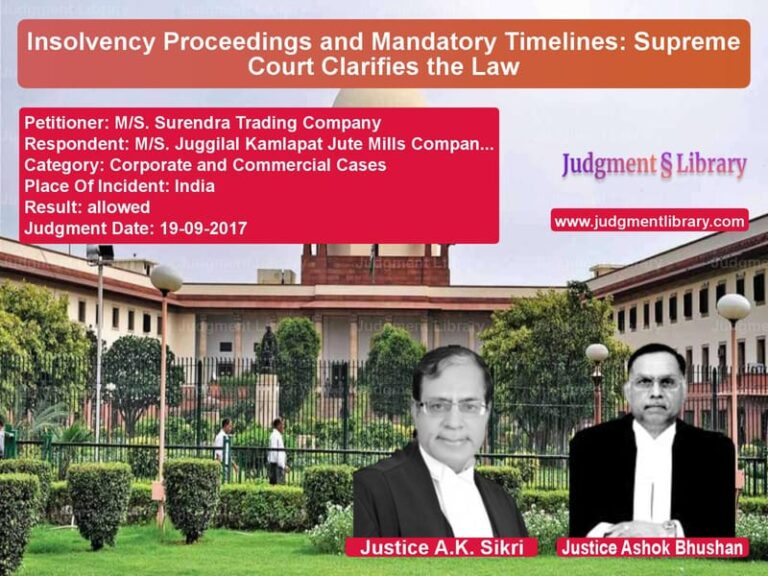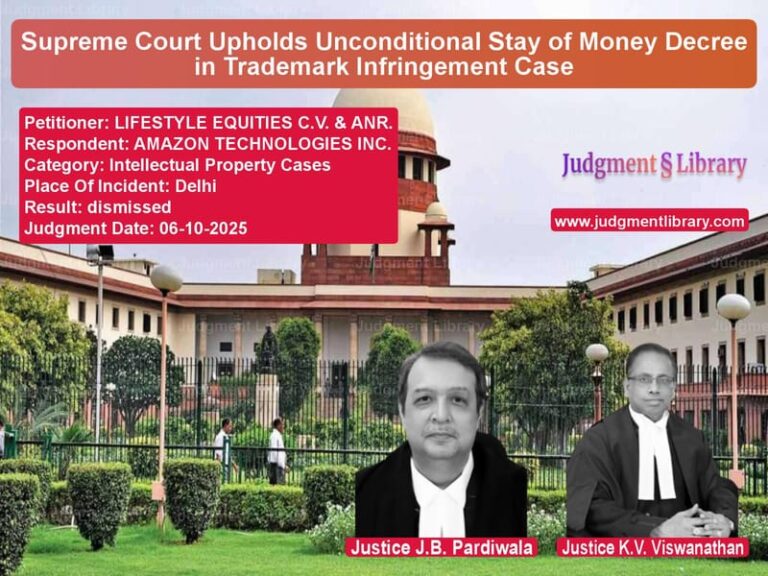Supreme Court Acquits Man in 1988 Odisha Murder Case After 36 Years
The Supreme Court of India has acquitted Jasobanta Sahu, who had been convicted for the murder of Laxminarayan Sahu in 1988. The case, Jasobanta Sahu vs. State of Odisha, involved a land dispute that led to the fatal stabbing of the deceased. The Supreme Court found that the prosecution had failed to prove the case beyond reasonable doubt, dismissing the testimonies of key witnesses as unreliable.
Background of the Case
The case dates back to October 9, 1988, when a verbal dispute over family land turned violent. The prosecution alleged that Jasobanta Sahu stabbed his uncle, Laxminarayan Sahu, multiple times with a knife, resulting in his death at the scene. The FIR was registered on the same day at Jarapada Police Station, Angul.
After trial, the Sessions Judge, Dhenkanal, convicted Jasobanta Sahu under Section 304 Part I IPC (Culpable Homicide Not Amounting to Murder) and sentenced him to three years of rigorous imprisonment. However, in 2000, after a revision by the informant, the Orissa High Court overturned the verdict, convicting him under Section 302 IPC (Murder) and sentencing him to life imprisonment.
Read also: https://judgmentlibrary.com/supreme-court-partially-restores-dowry-harassment-case-in-jharkhand/
In 2022, Jasobanta Sahu challenged this decision before the Supreme Court.
Legal Issues Considered
The Supreme Court examined the following key issues:
- Whether the prosecution had proven beyond reasonable doubt that Jasobanta Sahu committed the murder.
- Whether the eyewitness testimonies were credible.
- Whether the alleged extra-judicial confession was reliable.
- Whether the conviction should be upheld based on circumstantial evidence.
Arguments by the Appellant (Jasobanta Sahu)
- The case was based on false allegations arising from family land disputes.
- The alleged eyewitnesses, PW1-Kirtan Sahu and PW2-Nagendra Pradhan, were not present at the scene.
- The extra-judicial confession was not voluntary and should not have been relied upon.
- The prosecution’s version was inconsistent, and the delay in recording statements of key witnesses cast doubt on the case.
Arguments by the Respondent (State of Odisha)
- The prosecution presented multiple witnesses who claimed to have seen the accused stabbing the deceased.
- A knife was recovered based on information given by the accused.
- The extra-judicial confession made to PW6-Purna Chandra Pradhan was voluntary and confirmed the guilt of the accused.
Supreme Court’s Judgment
The Supreme Court ruled in favor of the appellant, setting aside his conviction. The Court found significant discrepancies in the prosecution’s evidence.
1. Eyewitness Testimonies Were Unreliable
- PW1-Kirtan Sahu claimed to have witnessed the incident from 40-50 feet away but fled out of fear. However, his statement was recorded 4-5 days later, raising concerns about its credibility.
- PW2-Nagendra Pradhan admitted that he was in a remote area for five days after the incident and did not report the crime immediately.
- The Supreme Court held that such delays cast serious doubt on the reliability of their statements.
2. Extra-Judicial Confession Was Weak
- The confession allegedly made to PW6-Purna Chandra Pradhan was full of inconsistencies.
- The Court noted that extra-judicial confessions must be voluntary, cogent, and reliable, which was not the case here.
3. Recovery of Knife Was Unreliable
- The prosecution argued that the accused led the police to recover the murder weapon.
- However, the knife was recovered from an open area, making it impossible to prove that the accused had exclusive knowledge of its location.
- The Supreme Court held that such a recovery was not sufficient to convict the accused.
4. Acquittal and Release
- The Supreme Court found that the prosecution had failed to establish guilt beyond a reasonable doubt.
- Both the High Court’s conviction and life sentence were quashed.
- The appellant was ordered to be released immediately, unless required in another case.
Legal Implications of the Judgment
This judgment reinforces several important legal principles:
- Reliability of Witnesses: Testimonies given after significant delays must be treated with suspicion.
- Standard for Extra-Judicial Confession: Such confessions should be voluntary, consistent, and corroborated by independent evidence.
- Burden of Proof in Murder Cases: The prosecution must prove guilt beyond a reasonable doubt, and inconsistencies weaken its case.
- Judicial Review of Convictions: The Supreme Court’s intervention ensures that wrongful convictions are overturned.
Conclusion
The Supreme Court’s decision in Jasobanta Sahu vs. State of Odisha is a landmark ruling that protects the rights of accused individuals against wrongful convictions. After spending 36 years fighting for justice, the appellant has been acquitted due to weak prosecution evidence. This case serves as a reminder of the importance of fair trials and the role of appellate courts in correcting judicial errors.
Petitioner Name: Jasobanta Sahu.Respondent Name: State of Odisha.Judgment By: Justice B.R. Gavai, Justice Sandeep Mehta.Place Of Incident: Dhenkanal, Odisha, India.Judgment Date: 30-04-2024.
Don’t miss out on the full details! Download the complete judgment in PDF format below and gain valuable insights instantly!
Download Judgment: jasobanta-sahu-vs-state-of-odisha-supreme-court-of-india-judgment-dated-30-04-2024.pdf
Directly Download Judgment: Directly download this Judgment
See all petitions in Murder Cases
See all petitions in Attempt to Murder Cases
See all petitions in Judgment by B R Gavai
See all petitions in Judgment by Sandeep Mehta
See all petitions in allowed
See all petitions in Quashed
See all petitions in supreme court of India judgments April 2024
See all petitions in 2024 judgments
See all posts in Criminal Cases Category
See all allowed petitions in Criminal Cases Category
See all Dismissed petitions in Criminal Cases Category
See all partially allowed petitions in Criminal Cases Category

